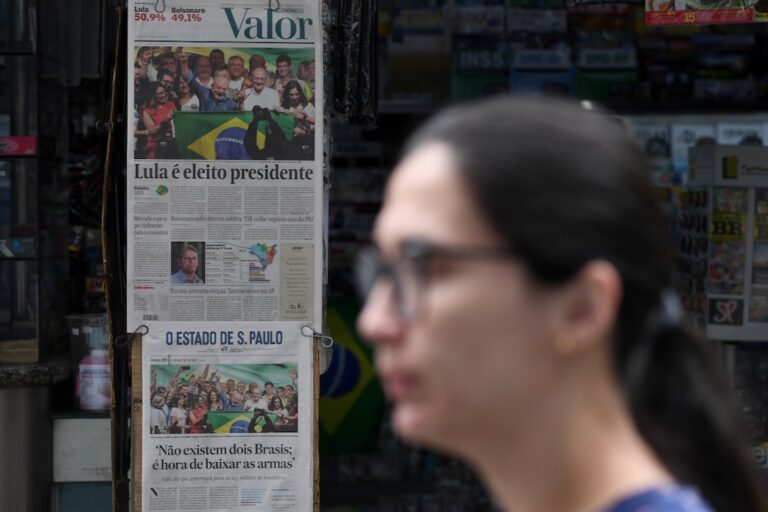(PERIODISTAS/IFEX) – During the last week of June and first week of July 2001, the Rio Grande do Sul state government in Brazil discredited journalist Luis Milman and pressured the current events magazine “IstoÉ” to stop the publication of an article that detailed irregularities committed by the state government in exploiting games of chance. In […]
(PERIODISTAS/IFEX) – During the last week of June and first week of July 2001, the Rio Grande do Sul state government in Brazil discredited journalist Luis Milman and pressured the current events magazine “IstoÉ” to stop the publication of an article that detailed irregularities committed by the state government in exploiting games of chance.
In the article by “IstoÉ”, Milman and editor of the magazine’s Internationals section, Claudio Camargo, stated that the government was implementing a new form of betting called “Loteria On Line-Real Time”, even though the Rio Grande do Sul state Prosecutor’s Office of the Federal Public Ministry had already advised “the government that the legalisation of lotteries or any other game of chance on a state-wide basis, as it is being done, is unconstitutional.”
Rio Grande Governor Olívio Dutra’s administration is being inspected by the Public Security’s Parliamentary Investigative Commission (Comision Parlamentaria Investigadora, CPI), which is investigating possible connections between the state government and secret gambling. In their note, Milman and Camargo revealed that on 17 May two members of the head of police administration, formed at the beginning of the Dutra government, told CPI that “in January 1999, the then chief of police, chosen by the PT (the Worker’s Party, Partido de los Trabajadores, to which the governor belongs), Luiz Fernando Tubino da Silva, informed the first rank police officers about an alleged decision by government officials: the state lottery would no longer be restricted because the money raised would be put towards the government’s social services.”
Before the article was published, the state government tried to convince Camargo not to publish parts of it that the government felt were incorrect. An official press adviser, journalist Denise Montovani, tried to discredit Milman, alleging that his actions were questionable because of his renowned opposition to the government and as a member of an organisation (Movement for Justice and Human Rights, Movimento de Justiça e Direitos Humanos, MJDH) that filed a suit against the public administration for the same occurrences that he was reporting on.
Since the magazine decided to publish the article without any changes, retaliation by the state government did not take long. A statement by the government’s Press Advisory head, Guaracy Cunha, accused the journalists of violating “all codes of ethics known to the Brazilian press” and he stressed his annoyance at the latitude “IstoÉ” gave Milman. Cunha also stated that the article contained grave and premeditated information errors, and that “the journalists would have to answer legally” to some of the passages in the article.
Milman refuted the allegations and qualified them as a “scandolous and incredible” attempt to raise suspicions and obstacles in the exercise of his job. The journalist and university professor claimed his right to work at the MJDH and denied that his participation in complaints against the government took away from the veracity of his investigation.
“What I do, that in which I am involved, the opinions I defend, where and how I display them, none of this causes me to be incapable of working as a journalist with dignity and respect for the priniciples that pertain to this profession,” he stated. He concluded that Montovani’s attitude was wrought with criticism, “without any scruples or shame, raising suspicions about a professional, close to his colleagues and yet upon contracting the journalist’s services, gives them indispensable credibility.”
The MJDH opposed the government’s attitude and criticised its “extremely perverse and antidemocratic face” and its frequent persecution of journalists. “It is becoming a sad routine, the attacking, intimidating and filing of complaints against press professionals, who through their independence are not swayed by power and those in power at the time,” stated the organisation.


